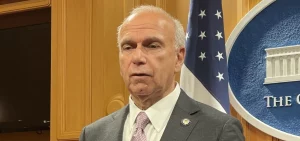News
Ohio public university trustees meet to discuss a bill that makes big changes in higher education
By: Karen Kasler | Statehouse News Bureau
Posted on:
COLUMBUS, Ohio (Statehouse News Bureau) — Trustees from Ohio’s public colleges and universities gathered at the Statehouse Monday for the first-ever statewide trustees symposium. It was organized by the Republican sponsor of a bill that would make big changes that many conservatives have wanted at higher education institutions, including banning most diversity training and faculty strikes and requiring “intellectual diversity” in classes that deal with specific issues.

The Ohio State University Board of Trustees opposed the bill before it passed the Senate in May, but some OSU trustees attended the symposium.
Cirino told reporters afterward there were some hot issues discussed among the trustees, including his bill’s requirement that “intellectual diversity” must be permitted on “controversial issues” specifically named in the bill. SB 83 lists them as “climate policies, electoral politics, foreign policy, diversity, equity, and inclusion programs, immigration policy, marriage, or abortion.”
“I think that was probably the topic that was most of interest to a lot of the people I spoke with,” Cirino said after the meetings concluded. “But I think there are some other logistical things, looking at how trustees can use their responsibility to make sure they’re monitoring quality and outcomes in our institutions.”
Cirino has been critical of university faculty, who have objected strongly to his bill. He told the trustees they need to “challenge your presidents and the rest of the staff at your institutions to think outside the box.”
“Some of your presidents might resist change. I can tell you, your faculty will definitely resist change,” Cirino said. “It’s been my experience, but your students will be the ones who will benefit from your willingness to challenge the status quo in how things have always been done.”
Senate President Matt Huffman (R-Lima) had proposed putting the changes in SB 83 into the state budget, but they were removed by the House. He agreed with Cirino that addressing the needs of students and of the businesses that will hire them is critical.
“One of the things that Jerry is trying to accomplish and I would like to try to accomplish is, how do we empower boards of trustees at universities to make critical decisions so that they can look at the president and say, ‘we know that you have to eliminate these majors and we know that you have two students and six professors in this particular area’,” Huffman told the trustees. “We don’t have a Pontiac salesman anymore because they don’t make Pontiacs anymore. So we’re going to have to let the Pontiac salesmen go or he’s going to have to go sell Teslas or something else, like any other business.”
SB 83 also requires trustees to complete annual training developed by the Chancellor of Higher Education, and shortens their terms from nine years to four years. Gov. Mike DeWine, who appoints trustees, has said he’s concerned about that provision, but he’s been supportive of the bill.
Cirino sent a questionnaire to potential university trustees in August, asking them nine questions related to their positions on the First Amendment rights of employees and students at universities, on faculty tenure and on who they feel they’re responsible to: “the president, Board chairperson, or taxpayers of Ohio?” He said the questionnaire was not a “political litmus test”, and that he received positive responses from it.
Cirino said SB 83 has undergone a lot of changes since it passed the Senate in May. He hopes the House will take action on it by mid-November. But Speaker Jason Stephens (R-Kitts Hill) said Tuesday that the bill is not ready to move in its current form.

